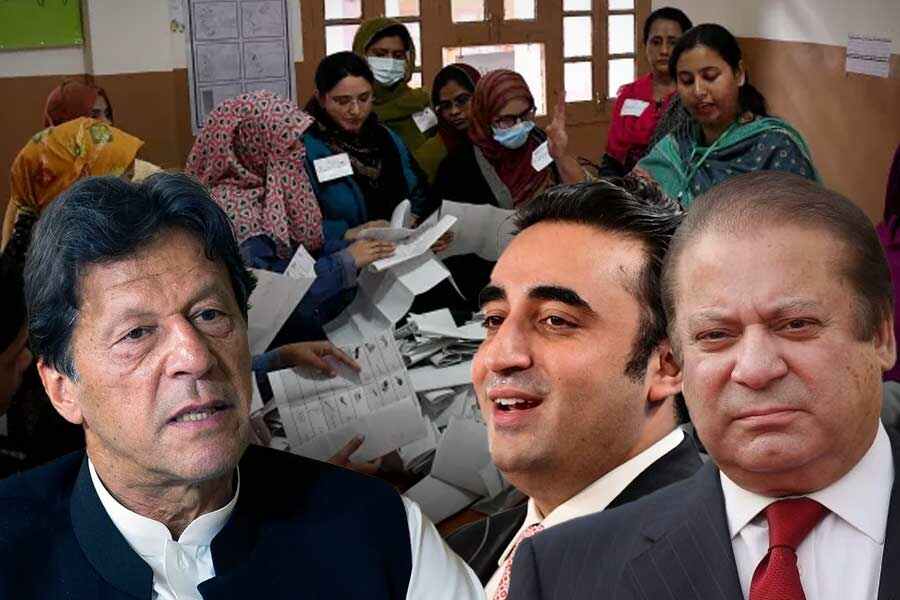News Desk, Kolkata : In the midst of the ongoing uncertainty surrounding the official announcement of election results, both the Pakistan Muslim League-Nawaz (PML-N) and the Pakistan Peoples Party (PPP) have already declared their intention to form alliances ahead of the official outcome. Former Prime Minister Nawaz Sharif and former Foreign Minister Bilawal Bhutto-Zardari have joined forces to secure a formidable presence in the lower house of the Pakistani Parliament, the National Assembly.
Bilawal, the son of former President Asif Ali Zardari and the scion of the Bhutto legacy, and Sharif held a meeting on Friday night to discuss collaboration following the electoral fervor. On Saturday afternoon, the two alliances officially announced their coalitions for the upcoming political scenario. The National Assembly currently comprises a total of 336 seats, with a direct contest for 266 seats. However, due to the unfortunate demise of one candidate, the actual contested seats stand at 265. The remaining 70 seats are reserved for women and religious minorities according to the Pakistani constitution.
Although the formation of the government depends on the directly contested 265 seats, the reserved seats hold significance in determining the overall dynamics. With the current situation, if any coalition secures the support of 133 victors, they could potentially command a majority in the lower house, leading to a significant influence in the National Assembly.
As of now, PML-N has won 71 seats, while PPP has secured 53. Imran Khan’s Pakistan Tehreek-e-Insaf (PTI) has claimed victory in 91 seats, and other independent candidates allied with PTI have won 35 seats. This suggests that the coalition has surpassed the majority threshold.
However, beyond these numbers, the political landscape is evolving, with several smaller parties and factions, including religious and nationalist groups, possibly tilting the balance in favor of one coalition or another. The Election Commission of Pakistan’s decision to annul the recognition of the PTI as a ‘political party’ has eliminated their direct representation in the reserved seats, forcing them to compete directly for votes.
Intriguingly, until now, the contesting candidates who have emerged victorious in the National Assembly are predominantly from the opposition. This underscores the potential dominance of the opposition in the lower house, excluding the seats reserved for women and religious minorities. Therefore, the current numerical superiority lies with the opposition parties in the National Assembly.
The narrative takes a compelling turn as PTI leader Imran Khan, currently facing legal challenges, delivered what can be termed as a ‘victory speech’ using artificial intelligence assistance on Saturday morning. He asserted that Nawaz Sharif’s ‘London Plan’ has failed and claimed widespread public support for his party in Pakistan. Khan appealed to the people, stating, “You have exercised your democratic rights; now it is your responsibility to safeguard them.”
While former cricket captain and World Cup-winning skipper Imran Khan refrained from making direct comments, allegations surfaced regarding the potential involvement of Sharif-supportive military personnel in influencing votes, especially in key constituencies where the results flipped in the final hours.
Despite the unfolding drama, it remains uncertain whether the Pakistan Army, historically known for interfering in political matters, will back the Sharif-Bhutto coalition or exert pressure on Imran Khan’s PTI. The last-minute switch in results in certain constituencies hints at the active role of pro-Sharif military officials in steering the election outcomes.
In conclusion, the battle for political dominance in Pakistan has intensified as the opposition, led by the PML-N and PPP alliance, seeks to form a government. The numbers, alliances, and behind-the-scenes maneuvers are shaping the narrative of Pakistan’s political future, with the potential for unexpected twists as the drama unfolds.
DISCLAIMER
Our news media denounces any form of bias and disapproves of sensationalism. The disseminated news is entirely educational and aimed at social awareness. Our media maintains absolute impartiality, adhering solely to the purpose of education and social consciousness.


